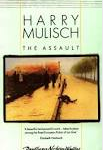 In January 1945, Haarlem in the Netherlands still awaits liberation from the Nazis. Anton Steenwijk, 12 years old, lives with his mother, father and older brother in a canal-side house, among four houses that were meant to be the beginning of a housing development. The Steenwijks have kept their heads down throughout the Occupation, and survived so far, even without enough food for two growing boys or enough fuel to heat their house. Then a collaborator, the Police Chief of Haarlem, is shot and killed in front of one of the four houses. In the ensuing Nazi actions, Anton’s father, mother, and brother are killed. Anton, sitting in a police car, is forgotten for a while. He is taken to a jail, where he spends a dark night in a cell with a woman, whose name he never learns, who has been wounded. Eventually the Nazis deliver Anton to an uncle in Amsterdam, who adopts him.
In January 1945, Haarlem in the Netherlands still awaits liberation from the Nazis. Anton Steenwijk, 12 years old, lives with his mother, father and older brother in a canal-side house, among four houses that were meant to be the beginning of a housing development. The Steenwijks have kept their heads down throughout the Occupation, and survived so far, even without enough food for two growing boys or enough fuel to heat their house. Then a collaborator, the Police Chief of Haarlem, is shot and killed in front of one of the four houses. In the ensuing Nazi actions, Anton’s father, mother, and brother are killed. Anton, sitting in a police car, is forgotten for a while. He is taken to a jail, where he spends a dark night in a cell with a woman, whose name he never learns, who has been wounded. Eventually the Nazis deliver Anton to an uncle in Amsterdam, who adopts him.
BUY NOW: The Assault by Harry Mulisch
Anton grows up, becomes a doctor, marries once and has a child, divorces and remarries and has a second child. The events of January 1945 are buried, except that they’re not: in subsequent years, Anton goes back once or twice to Haarlem to visit. Various people who were involved that night reappear in Anton’s life, including the son of the murdered man who is a former classmate of Anton’s, and the resistance members who planned the assassination. The Netherlands is a small country, and Mulisch is skillful at making what might seem too easy a coincidence utterly persuasive. Each person Anton meets has his own experience of that night, and his own understanding of what actually happened. With every piece of the puzzle, Anton relives the assault, but also comes to a fuller understanding of the roles everyone around him – his parents, the resistance fighters, the neighbors, the bystanders – experienced as events played out.
Mulisch assumes the Germans’ guilt, of course, but it’s the degrees of guilt of nearly all the parties involved that Mulisch explores. The Steenwijks become involved when one of their neighbors moves the body in front of their house. Why move it there? Perhaps because one of the neighbors has something to protect. Does Anton’s school friendship with the assassinated man’s son Fake make him guilty in some way? It’s through Fake that Anton learns a central piece of what happened. What about the resistance? They were willing to sacrifice Dutch families to a cruel fate in order to remove a hated collaborator.
Anton doesn’t need closure, but he does learn why events unfolded in the way they did. He lived through the war, Mulisch tells us, grew up and had children. In the face of that fact the guilt or innocence of others almost doesn’t matter. “The Assault” is a disturbing and gripping story about everything that makes us human from one of the 20th century’s best writers. What’s your take on this small gem? Let us know in the comments.
Have a book you want me to know about? Email me at asbowie@gmail.com. I also blog about metrics at asbowie.blogspot.com.


